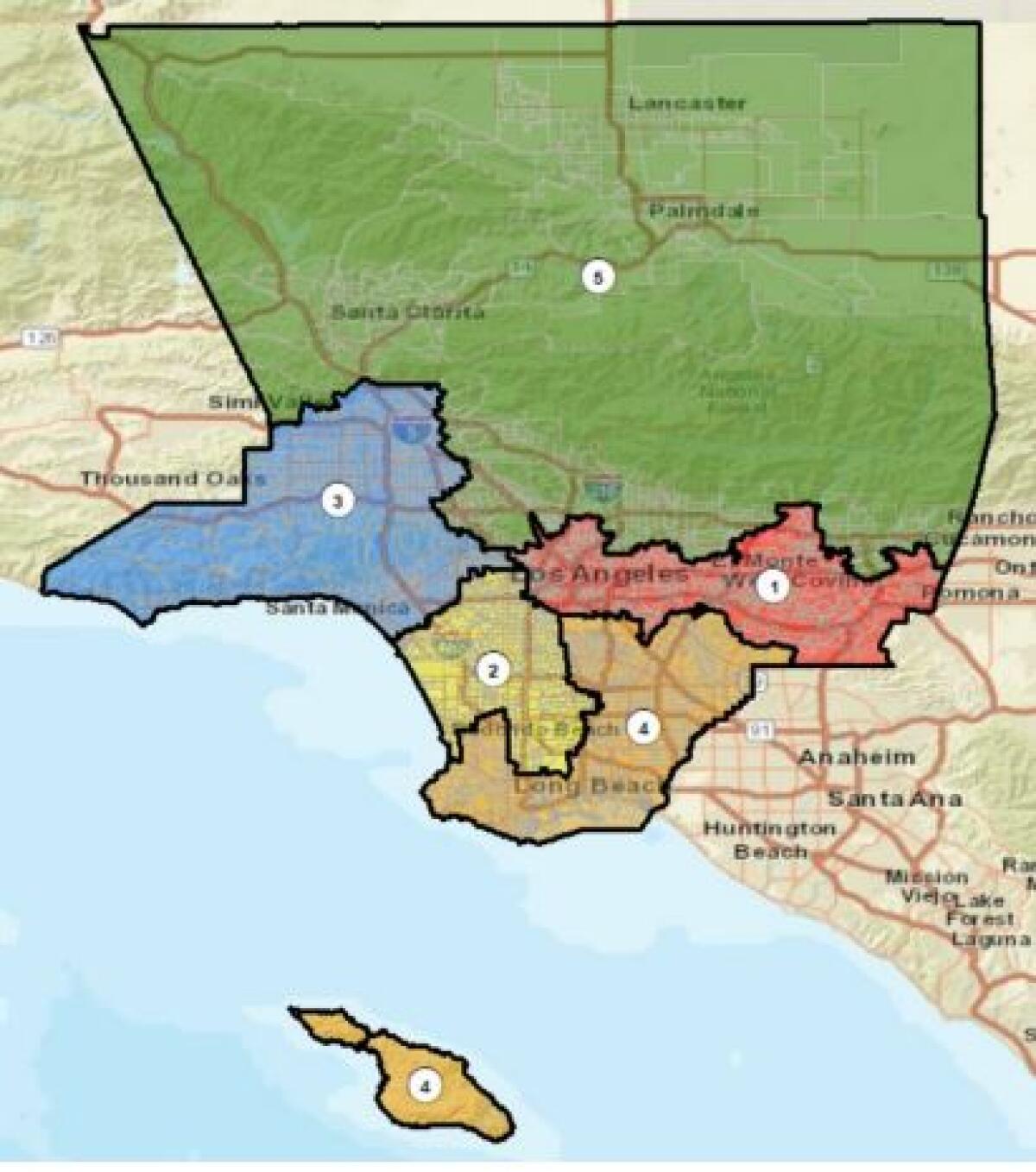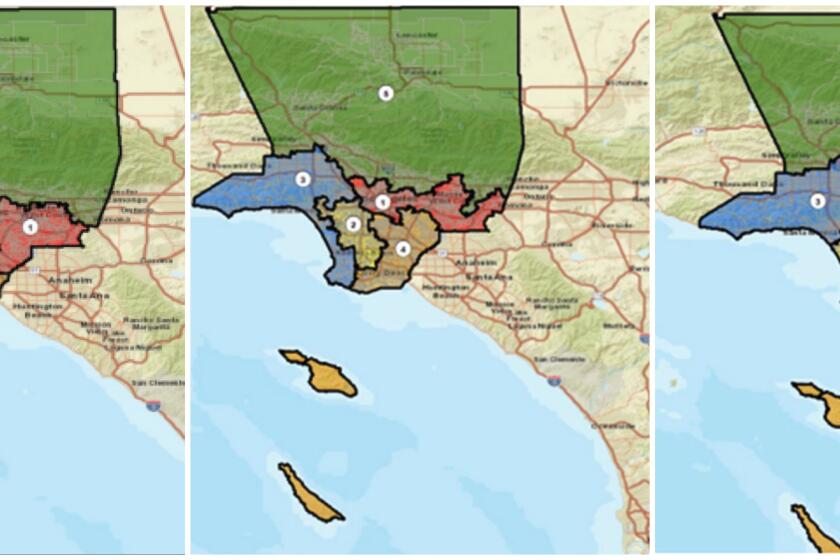Commission finalizes L.A. County supervisors map, creating a second majority-Latino district

- Share via
A citizens redistricting commission Wednesday approved a map for the Los Angeles County Board of Supervisors that creates a second majority-Latino district while maintaining a concentration of Black voters in South L.A. and grouping more Asian American voters together.
The new majority-Latino district was formed by removing wealthy beach cities, including Manhattan Beach and Hermosa Beach, from the 4th District and replacing them with heavily Latino communities.
For the first time, redistricting in L.A. County was in the hands of a 14-member citizens commission, created by the state Legislature in 2016 with the aim of giving Latino and Asian residents a better shot at representation.
Previously, the supervisors, sometimes referred to as the “five little kings” because of their unglamorous but powerful jobs in a county of more than 10 million, drew the lines for their own districts after the once-in-a-decade national census.
Before approving the map at a meeting Wednesday, many commissioners acknowledged that it wasn’t perfect.
They debated addressing a few minor issues, including the cleaving of a small portion of Thai Town into a different district from the rest of the neighborhood, but decided they didn’t have time before their state-mandated midnight deadline.
The L.A. County Citizens Redistricting Commission finalized its map for the L.A. County Board of Supervisors five districts.
The map, which went into effect immediately, creates a new political reality for the supervisors, who lost loyal constituents and have new ones to court.
It prompted a sharp rebuke from 3rd District Supervisor Sheila Kuehl, who accused some politicians eyeing a seat on the board of influencing the commissioners.
“Ironically, this putatively apolitical and oh-so transparent Redistricting Commission’s final accomplishment was the rushed adoption of a strategically manipulated 11th-hour map,” Kuehl, who is not running for reelection, said in a mass email.
Supervisor Janice Hahn’s 4th District changes the most under the new map.
The wealthy beach cities Hahn represented went to Supervisor Holly Mitchell’s 2nd District, combining coastal areas from Marina del Rey to Redondo Beach with parts of Mid-Wilshire and South L.A.
Hahn now represents the second majority-Latino district, with the addition of heavily Latino communities including South Gate, Huntington Park and Lynwood that were previously in the 1st or 2nd districts.
“My job is to represent the residents of the Fourth District and not only ensure their voices and interests are heard, but also get them the resources they need,” Hahn said in a statement Tuesday.
Each map under consideration would create a second district with a large Latino voter population. But Black and Asian voters would be grouped differently.
Latino representation on the board has long been an issue in a county that is 49% Latino, 26% white, 15% Asian and 9% Black.
The first Latino supervisor, Gloria Molina, was elected in 1991 after a judge found the supervisors had gerrymandered district lines to keep the growing Latino population from power.
Hilda L. Solis, who is Latina, succeeded Molina as supervisor for the 1st District, which will remain majority-Latino despite losing some Latino voters.
Mitchell is Black, and the other three supervisors are white. Mitchell’s 2nd District was previously represented by Mark Ridley-Thomas, who is Black.
Under the new map, the 2nd District maintains roughly the same percentage of Black voters — about 29% — as before, with much of South L.A. and cities such as Compton and Inglewood remaining within its boundaries.
Still, advocates have raised concerns that adding predominantly white communities, including Manhattan Beach and Hermosa Beach, to the 2nd District makes it harder for Black politicians to win the seat.
Since the last redistricting in 2010, the percentage of Latino voters in the 2nd District has grown from 32% to 41%, with Black voters declining from 38% to 30%.
These are “the toughest choices we are making right now, in terms of what to do with [districts] 2 and 4,” commission co-chair Daniel M. Mayeda said at a meeting Sunday.
Mitchell said in a statement Tuesday that she appreciated the commission’s hard work and wouldn’t comment on the new map.
The new map decreases the percentage of Latino voters in Solis’ 1st District to 52% from 62%.
Solis gains more Asian American voters, with Hacienda Heights, Rowland Heights and Diamond Bar moving from the 4th District to join the majority Asian cities of Monterey Park and Rosemead, which she already represented.
That brings the Asian voter percentage in Solis’ district to almost 27% — the highest in any district in at least two decades.
L.A. County has never had an Asian American supervisor, in part because Asian voters are concentrated in areas such as the San Gabriel Valley, central L.A. and South Bay that are widely separated geographically.
In a statement, Solis said goodbye to the southeast L.A. communities that have left her district.
“I’ve had the honor of connecting with a constituency that has experienced decades of underinvestment in an effort to drive regional, systemic changes and close the equity gaps that have hurt SELA unjustly for so long,” she said.
She also said she would immediately get to know the needs of her new constituents, including Asian Americans in the San Gabriel Valley.
Fidela Villasano’s entire world was upending.
Under the new map, Kuehl’s 3rd District lost some world-renowned cultural venues — the Hollywood Bowl, the L.A. County Museum of Art, the Ford, the La Brea Tar Pits and the Academy Museum of Motion Pictures — to the 2nd and 5th districts.
Kuehl and her predecessor Zev Yaroslavsky allocated millions to improving the venues.
Commissioner David A. Holtzman, a public health professional and election reform advocate, proposed those changes at the Sunday meeting.
He argued that linking studio-heavy Burbank, already in the 5th District, with other entertainment and media centers made sense. He had previously advocated adding Hollywood to the 5th but was “rebuffed,” he said.
The commissioners, who were chosen to reflect the county’s demographics, are unpaid volunteers and forbidden to communicate with supervisors or their close associates.
The federal Voting Rights Act requires that district lines be drawn so that racial and ethnic groups have a fair chance to elect a candidate of their choice.
In the last year, the commissioners held more than a dozen public hearings, reviewing 3,800 written public comments and almost 600 delivered orally.
They narrowed the proposed maps down to three — all of which created a second majority-Latino district — before selecting a map Sunday that was approved by the final vote Wednesday.
Kuehl’s email lambasted the Holtzman changes.
Moving conservative-leaning San Fernando Valley communities, including Chatsworth and Porter Ranch, from the 5th District to the 3rd creates a more “centrist” 3rd District while making Kathryn Barger’s 5th District easier for a Democrat to win, she wrote.
Without naming names, she said that politicians interested in the seats influenced the commission to “shape their own dream districts.”
Barger, who plans to run again in 2024 and is the board’s only Republican, was more muted.
“I’m surprised it’s so different than the maps that were being considered (before Sunday), but again, I’m ready to roll up my sleeves and get to know my new constituents, which is my style anyway,” Barger said Thursday.
On the heels of the new map, State Sen. Henry Stern announced his candidacy for the 3rd District on Thursday. Assemblyman Richard Bloom, L.A. City Controller Ron Galperin and West Hollywood Councilmember Lindsey Horvath have previously said they are running for the seat.
And more might come forward. On Tuesday, Senate Majority Leader Robert Hertzberg tweeted that he is “seriously considering running” in the 3rd District.
More to Read
Sign up for Essential California
The most important California stories and recommendations in your inbox every morning.
You may occasionally receive promotional content from the Los Angeles Times.












